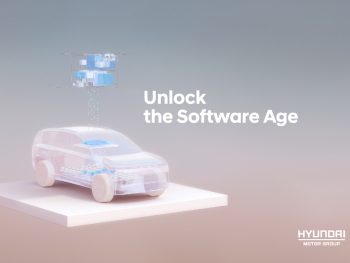Hyundai Motor Group to bolster connected car and EV work with £11bn invest
Hyundai Motor Group is to invest some £11bn globally in software technology that will further drive developments in connected and autonomous cars and vehicle electrification.

The group’s ‘Integrated Modular Architecture’ will lead to further standardisation and modularisation of core components of electric vehicles
The automotive giant – parent firm of Hyundai, Kia and Genesis – revealed the plans at its ‘Unlock the Software Age’ global online forum, saying it will transform the customer experience and “deliver an unprecedented era of mobility via constantly evolving software technology”.
A core part of the new strategy is a commitment for all group vehicles to be equipped to receive over-the-air software updates by 2025, enabling enhanced performance and functionality anytime.
The carmaker expects 20 million vehicles to be registered to its connected car service worldwide by 2025, supported by its next-generation EV platform, integrated controller and an internally developed Connected Car Operating System (ccOS). The latter will “process data at blazing speeds” and offer customers personalised services – FoD (Feature on Demand) solutions will be available from next year.
The group added that connected vehicles equipped with cutting-edge telecommunication features would create unprecedented value and possibilities and provide customers personalised services, such as software subscriptions.
Connected car data will also network with future mobility solutions planned. These include purpose-built vehicles (PBVs), advanced air mobility (AAM), robotaxis and robots. Hyundai Motor Group will also look to build data-based platform partnerships with industry sectors such as logistics, accommodation, leisure and entertainment, in order to revolutionise mobility.
The group’s so-called SDV transformation will also be underpinned by its next-generation EV platform. It will introduce vehicles in 2025 based on its two new EV platforms: eM and eS. The new EV platforms will be created under the group’s Integrated Modular Architecture (IMA) system, enabling further standardisation and modularisation of core components of electric vehicles, such as batteries and motors, while offering other advantages.
The eM platform is being developed specifically for EVs across all segments and will provide a 50% improvement in driving range on a single charge compared to current EVs. The eM platform is also being developed to support Level 3 or higher autonomous driving technology and OTA software update features.
The eS platform will be developed as an EV ‘skateboard’ exclusively for purpose-built vehicles, with a fully flexible structure to meet B2B demands and provide tailor-made solutions for companies operating in the delivery, logistics and car-hailing sectors.
Hyundai Motor Group also said it would significantly strengthen its competitiveness in autonomous driving technology through the new ccOS operating system, which will support the software technology required to analyse and process data ultra-rapidly.
Chung Kook Park, president and head of R&D Division, Hyundai Motor Group, said: “Our holistic approach will empower Hyundai Motor Group to lead the transformation in the mobility paradigm. As we take these technological innovations from imagination to reality, Hyundai Motor Group will unlock the future potential of the car and open up new possibilities to rewrite the customer experience and deliver a new way of life, abundant with meaning and value.”

